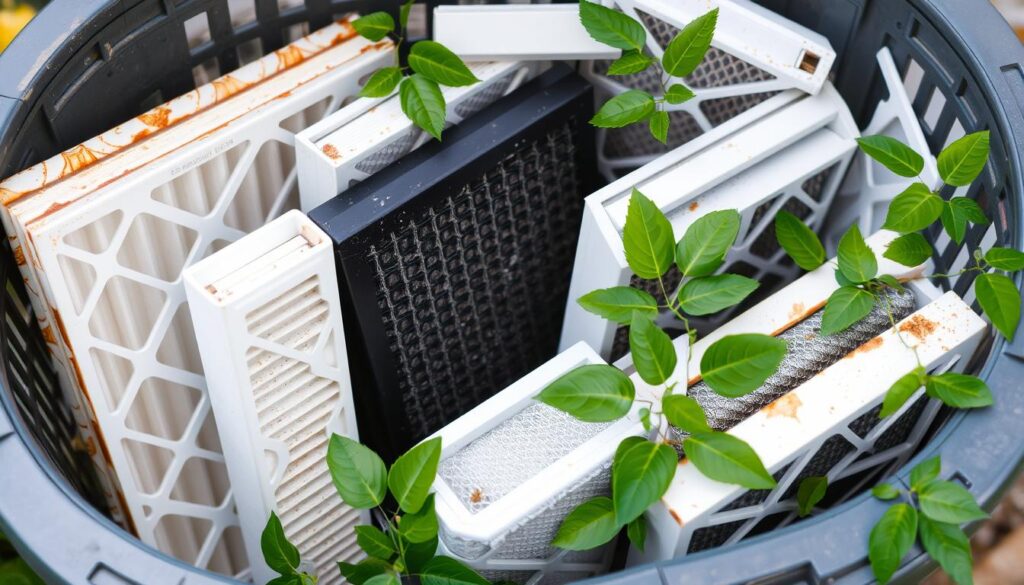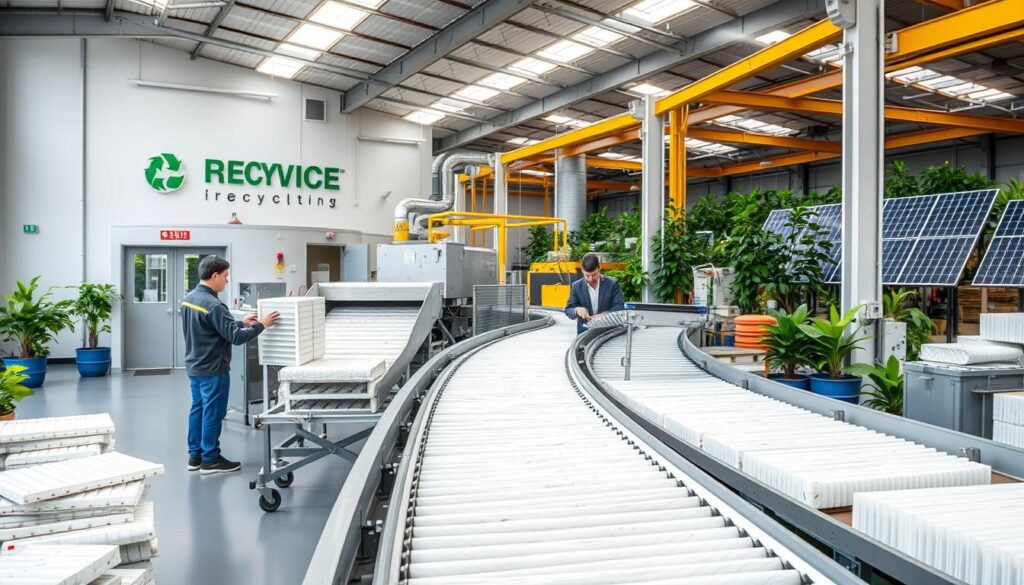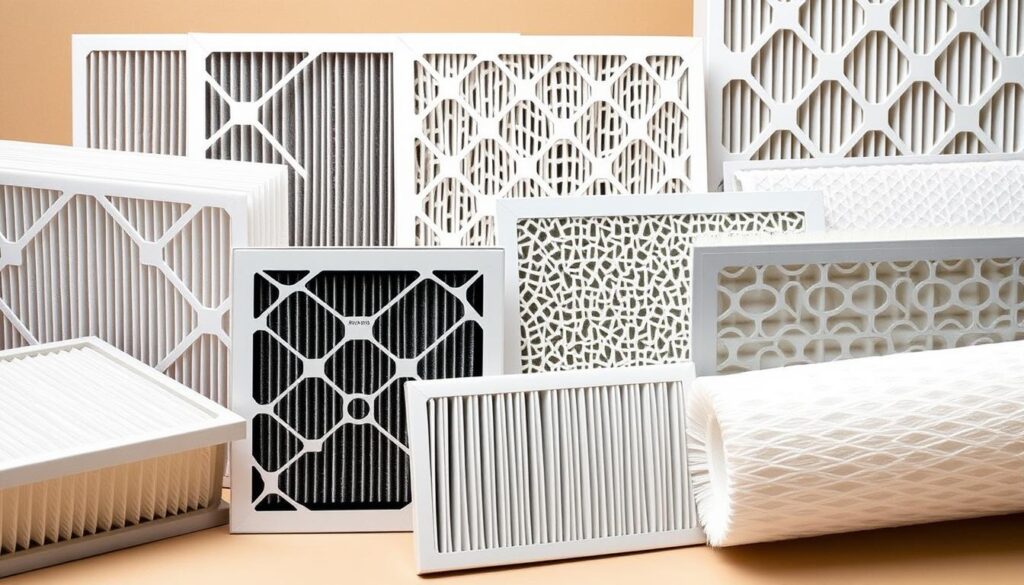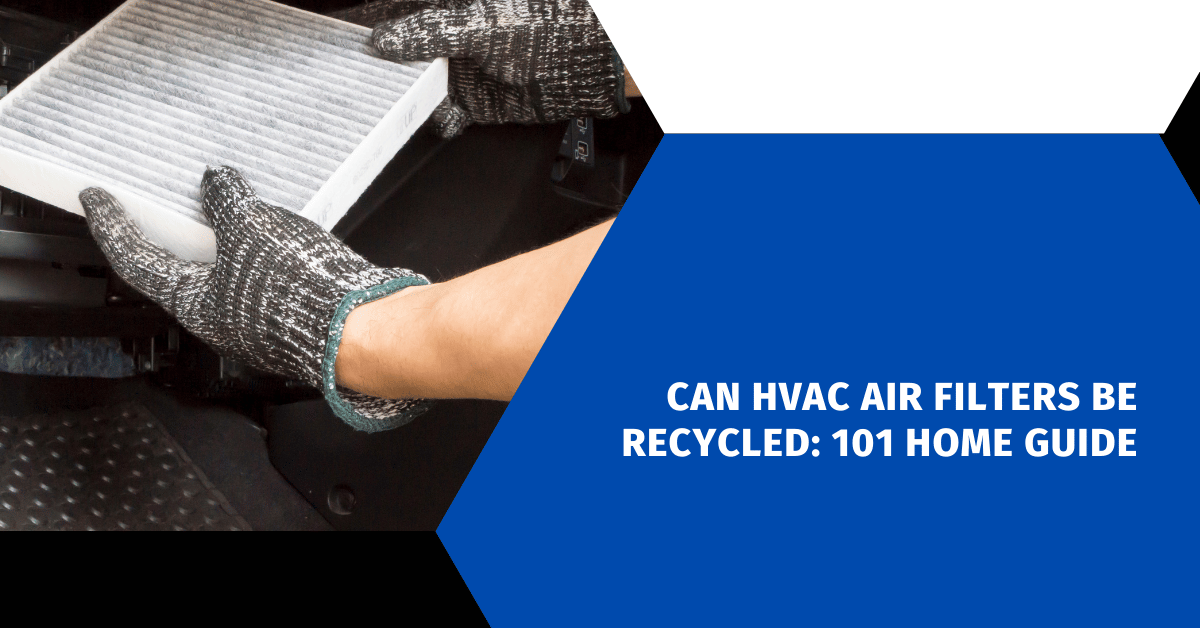Affiliate Disclosure
HVAC Guide Guys is a participant in the Amazon Services LLC Associates Program, an affiliate advertising program designed to provide a means for sites to earn advertising fees by advertising and linking to Amazon.
Can HVAC Air Filters Be Recycled? Did you know that homes go through 4 to 12 HVAC air filters every year? This shows how important it is to know if these filters can be recycled. As a homeowner, figuring out how to dispose of and recycle these filters can be tough. In this guide, we’ll look into what HVAC air filters are made of, if they can be recycled, and eco-friendly options for your home.

Key Takeaways
- HVAC air filters are key for clean indoor air, with homes using 4-12 filters yearly.
- Recycling HVAC air filters is tricky because of their mix of recyclable and non-recyclable parts.
- Washable air filters are a green choice, but might not work for everyone.
- It’s vital to dispose of used air filters correctly to protect the environment.
- Keeping your filters clean is crucial for your HVAC system’s efficiency and saving energy.
Table of Contents
Understanding HVAC Air Filter Components
HVAC air filters are key to keeping your air clean and your system running well. They come in many types, each designed for different needs. Knowing about these components helps you choose and care for your filters wisely.
Common Filter Materials and Construction
Filters are made from materials like cardboard, plastic, and fibers. These materials catch dust, pollen, and pet dander. The filter’s design, whether pleated or flat, affects its performance.
Different Types of Filter Frames
Frames are made from cardboard, plastic, or metal. They support the filter and fit it right in your system. The frame’s material affects the filter’s durability and how long it lasts.
Filter Rating Systems Explained
When picking a filter, look at its MERV rating. This number shows how well the filter catches particles. Higher ratings mean better filtration but might use more energy.
| MERV Rating | Particle Size Removal Efficiency |
|---|---|
| 1-4 | Larger particles (pollen, dust mites) |
| 5-8 | Smaller particles (mold spores, pet dander) |
| 9-12 | Smaller particles (bacteria, smoke) |
| 13-16 | Smallest particles (viruses, fine dust) |
Understanding HVAC air filters is key to picking the right one. It ensures your air stays clean and your system works efficiently.
Explore Our HVAC Shop
Looking for top-rated HVAC tools, parts, and accessories? Visit our shop and find the perfect solution for your needs.
Visit the ShopThe Environmental Impact of Disposable Air Filters
Disposable air filters are used in HVAC systems but harm the environment. They contribute to waste and increase energy use. These filters often end up in landfills, adding to plastic pollution and waste.
Dirty or high MERV-rated filters make HVAC systems work harder. This leads to more energy use. It raises utility bills and increases carbon emissions, harming the environment.
- Disposable air filters are replaced every six weeks, creating a lot of waste.
- Dirty air filters make HVAC systems use more energy, harming the environment.
- Reusable air filters, like those made of metals or fabrics, are better for the environment. They can be cleaned and reused, reducing waste.
Regular maintenance and proper disposal of air filters are key to reducing HVAC system’s environmental impact. Choosing reusable filters and keeping them clean improves indoor air quality. It also helps the environment.
“Reusable air filters can significantly reduce a household’s carbon footprint by minimizing the number of disposable filters used and thrown away.”
While disposable air filters might seem convenient and affordable, their long-term environmental harm is significant. Switching to reusable filters and maintaining them properly helps reduce HVAC system’s environmental impact. It contributes to a more sustainable future.
Explore Our HVAC Shop
Looking for top-rated HVAC tools, parts, and accessories? Visit our shop and find the perfect solution for your needs.
Visit the ShopCan HVAC Air Filters Be Recycled
The question of recycling HVAC air filters is complex. Some parts, like cardboard or plastic frames, can be recycled. But, many materials, including fiberglass and polyester mesh, are hard to recycle. This mix makes recycling air filters a big challenge.
Recyclable Components
Cardboard or plastic frames in some filters can be recycled. But, they are just a small part of the filter. They must also be clean and free of contaminants.
Non-recyclable Materials
Most filters are made of materials that can’t be recycled easily. These include fiberglass, polyester mesh, and other synthetic materials. They are key to the filter’s function and durability but hard to recycle.
Contamination Concerns
Recycling filters is also tricky because of contamination. Filters catch dust and dirt, which can be harmful. Most recycling centers won’t take used filters because of these risks.
Even though recycling filters is hard, there are ways to help the environment. Proper disposal, following manufacturer and local rules, can help. Using reusable or washable filters also cuts down on waste.
Proper Disposal Methods for Used Air Filters
When recycling is not an option, it’s key to dispose of used HVAC air filters correctly. Seal the used filters in plastic bags to prevent particles from escaping. Some HVAC suppliers offer recycling programs for their air filters. To find recycling options near you, check local guidelines or use online tools like Recycle Smart.
Don’t shake or bang used air filters, as this can spread particles back into the air. Instead, carefully put the sealed plastic bag in an outside trash can. This keeps your indoor air clean. Also, turn off your HVAC system while replacing the filter to avoid unfiltered air.
Proper disposal of air filters is vital for clean indoor air and waste management. By using eco-friendly disposal methods, you help the environment. This contributes to a greener future.
| Disposal Method | Description |
|---|---|
| Seal in Plastic Bag | Contain the used filter in a plastic bag to prevent the release of captured particles. |
| Recycle Program | Check with your HVAC supplier or manufacturer for any available recycling programs for used filters. |
| Outdoor Disposal | Place the sealed plastic bag in an outside trash can to avoid indoor recontamination. |
| HVAC System Shutdown | Turn off your HVAC system during the filter replacement process to prevent the circulation of unfiltered air. |
By using these disposal methods for used air filters, you help manage waste responsibly. This keeps your indoor space healthy and eco-friendly. Remember, how often you need to replace or clean filters depends on your HVAC system’s needs.
Explore Our HVAC Shop
Looking for top-rated HVAC tools, parts, and accessories? Visit our shop and find the perfect solution for your needs.
Visit the ShopSustainable Alternatives: Reusable HVAC Filters
Homeowners and businesses are looking for eco-friendly options. Reusable HVAC filters are a great choice. They last longer and save money over time.
Benefits of Washable Filters
Reusable air filters can last up to five years with care. This is much longer than disposable filters, which need to be replaced often. Even though they cost more upfront, they save money in the long run.
Maintenance Requirements
To keep washable HVAC filters working well, they need regular cleaning. This should be done every few months. It helps keep the air flowing smoothly. But, it might not be right for everyone, especially those with allergies or breathing problems.
Cost Considerations
Reusable filters cost more at first. But, they save money over time because you don’t need to replace them as often. This makes them a smart choice for many people.
Choosing between reusable and disposable filters depends on your needs and budget. Understanding washable HVAC filters helps make a choice that fits your goals and budget.
Professional Recycling Solutions and Services
Getting rid of old HVAC air filters might seem easy, but there are better ways. Professional recycling services can help lessen the harm to our planet. They have special programs for recycling filter recycling services to handle these materials right.
Mail-in recycling is one such option. Companies like TerraCycle let you send your filters to them for recycling. You might even get new filters made from recycled stuff back.
Also, some HVAC companies and makers of filters have their own recycling plans. Working with these companies means your filters get recycled the right way. It might cost a bit more, but you’ll know they’re being handled responsibly.
| Recycling Service | Description | Cost |
|---|---|---|
| Mail-in Recycling | Prepaid shipping labels for sending used filters to a recycling facility | Varies by program |
| HVAC Company Recycling | In-house recycling programs offered by local HVAC service providers | May be included in service fees |
| Manufacturer Takeback | Recycling initiatives from air filter brands and manufacturers | Typically free or low-cost |
Looking into these filter recycling services can make a big difference. It ensures your old HVAC air filters are recycled the right way. This helps make our planet a bit greener for the future.

Explore Our HVAC Shop
Looking for top-rated HVAC tools, parts, and accessories? Visit our shop and find the perfect solution for your needs.
Visit the ShopEnergy Efficiency and Filter Maintenance
Keeping your HVAC air filters clean is key for top energy efficiency and performance. Dirty filters can make your system use more energy. This leads to higher bills and more environmental harm.
Impact on HVAC Performance
Dirty filters block airflow, making your HVAC system work harder. This means it uses more energy and works less efficiently. It also raises your energy costs and environmental impact.
Recommended Replacement Schedules
- For most homes, air filters should be changed every 3 months.
- But, how often depends on the filter’s MERV rating, your environment, and how much you use your system.
- Some people might need to change filters every month or up to 6 months, depending on their situation.
Sticking to a regular filter change schedule helps your HVAC system use less energy. It also improves the air inside your home and reduces harm to the environment. Cleaning or replacing filters regularly is crucial for your system’s best performance.
| Filter Type | MERV Rating | Replacement Frequency | Energy Efficiency Impact |
|---|---|---|---|
| Flat Filters | 1-4 | Monthly | Moderate |
| Electrostatic Filters | 1-4 | Up to 10 years with proper care | Moderate |
| Pleated Filters | 5-8 | 3 months | High |
| HEPA Filters | 13-16 | Annually | Highest |
By focusing on filter care and following the right replacement times, your HVAC system will run at its best. This means better energy use, top performance, and less harm to the environment.
Special Considerations for Different Filter Types
Recycling HVAC air filters depends on the type you have. Furnace filters, for example, have lower MERV ratings. They also mix recyclable and non-recyclable materials, making recycling harder.
Commercial filters are bigger and made of tougher stuff. This makes recycling them even more challenging. Always check with the manufacturer or a local HVAC expert for recycling tips specific to your filter.
Recyclable and Non-recyclable Filter Components
- Fiberglass filters, common in homes, can’t be recycled because of their fiber and contamination. They must be thrown away.
- Pleated filters, made from paper and metal, could be recycled. But, separating these materials is tough for recycling centers.
- Electrostatic filters can be washed and reused. This cuts down on waste and recycling needs.
- HEPA filters, great at catching small particles, have non-recyclable materials like fiberglass. This makes recycling them hard.
Reusable filters, like electrostatic and washable ones, cut down on waste and recycling needs. But, they need more upkeep and might cost more than disposable filters.
Homeowners should keep up with new filter tech and disposal methods. This helps make HVAC maintenance more eco-friendly. As the industry evolves, we might see more recyclable filter options, making HVAC systems greener.

“Advancements in recycling technology may make it easier to separate and recycle HVAC filter components in the future, contributing to increased feasibility in filter recycling efforts.”
Conclusion
Recycling HVAC air filters can be tough, but homeowners can still help the environment. Using reusable filters and disposing of old ones properly are key. Regular HVAC maintenance is also crucial for HVAC filter recycling.
Getting advice from HVAC experts can help find the best sustainable practices for your home. They can guide you to filters that are good for both air quality and the planet.
Changing air filters often is essential for clean air and a well-working HVAC system. Choosing sustainable options for your filters can help reduce waste and save resources. This way, you can keep your indoor air clean and help the environment at the same time.
By taking a comprehensive approach to managing HVAC filters, you can make your home more eco-friendly. Making smart choices about filters is a step towards a greener future. It benefits your community and the planet.

